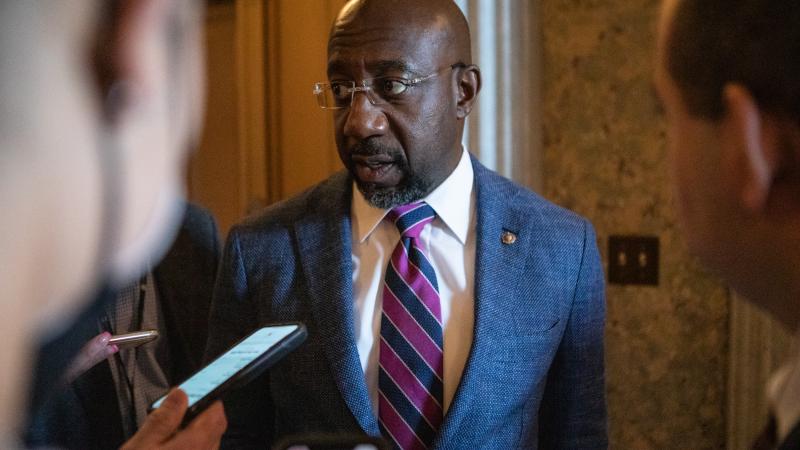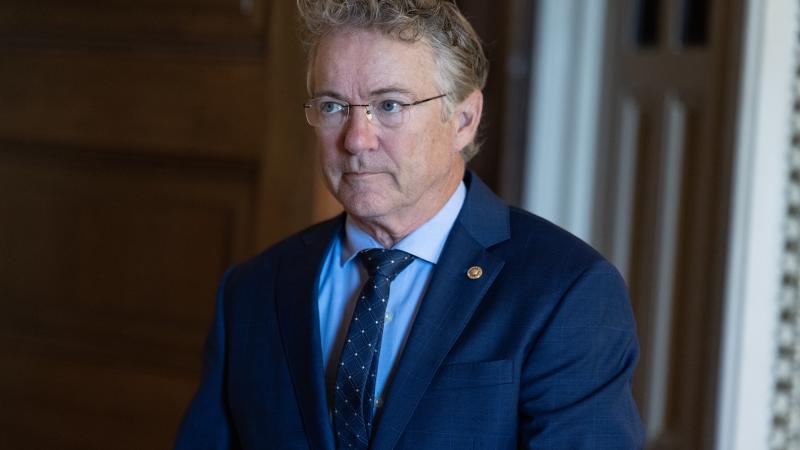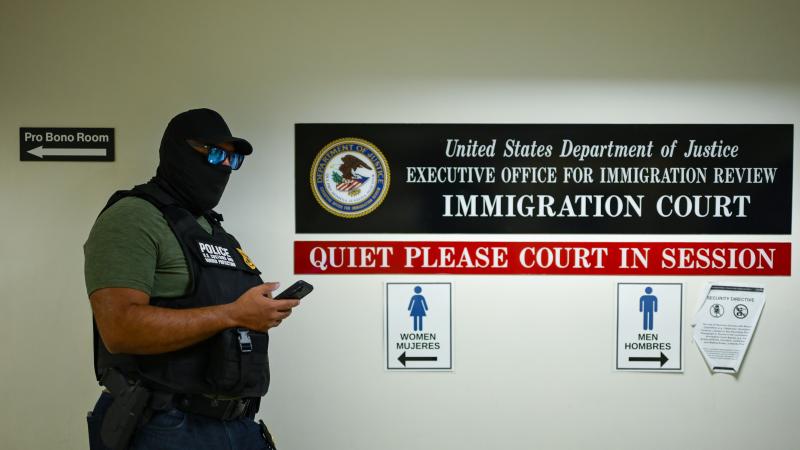House Intel inquiry sent criminal referral to DOJ on strange health incidents on Havana Syndrome
The House Intel Committee continues to ramp up its investigation of the intel community's mishandling of the mysterious illness dubbed the "Havana Syndrome."
The GOP-led House Intelligence Committee sent criminal referrals to the Trump Justice Department earlier in September related to the congressional panel’s scrutiny of the federal government’s alleged mishandling of the mystery behind the so-called “Havana Syndrome” — officially termed anomalous health incidents (AHIs).
A spokesperson for the GOP-led House Permanent Select Committee on Intelligence (HPSCI) who declined to be named due to the sensitivities surrounding the HPSCI investigation, told Just the News over the weekend that the committee’s ongoing inquiry into AHIs has scrutinized the response by the U.S. intelligence community (IC) and the National Institutes of Health (NIH) and has identified a number of potentially illegal actions — which were referred to the Justice Department earlier this month. The spokesperson did not identify the exact target of the criminal referral.
The U.S. government has been investigating the unusual symptoms reported among its personnel serving abroad. If a foreign adversary is behind the AHIs, speculation has centered on Russia, China, and Cuba as possible culprits. Symptoms tied to alleged AHIs have included sound or pressure in one ear or on one side of the head and nearly simultaneous signs such as vertigo, the loss of balance, headaches, and ear pain.
Intelligence community questioned by lawmakers
The HPSCI spokesperson said additional criminal referrals might still be sent to the DOJ, particularly related to HPSCI’s review of the IC’s potential obstruction of the House committee’s inquiry into Havana Syndrome.
The House Intelligence CIA Subcommittee released an unclassified interim report in December 2024 arguing that a foreign foe might be behind AHIs and that leaders of U.S. spy agencies had wrongly dismissed this hypothesis. The subcommittee was chaired by Rep. Rick Crawford, R-Ark., who now chairs the full intelligence committee. The December report seemed to jolt Biden intelligence community leaders into opening the door to the chance that a foreign foe could indeed be behind the AHIs.
“Since joining the House Intelligence Committee in 2017, investigating reported Anomalous Health Incidents impacting our intelligence officers, service members, and diplomats stationed around the world has been a top priority of mine personally and remains one of my top priorities as Chairman,” Crawford told Just the News in a statement this weekend. “As I have said before, the Biden administration’s IC was wrong in its intelligence assessment on AHIs, and we are working to set the record straight. The IC generated and utilized the NIH study’s invalid results to prop up the highly flawed 2023 intelligence community assessment.”
Crawford continued: “Among the many issues involved, the withholding of medical care to force participation in this human subject research study, as directed by personnel in the IC, betrayed those desperately seeking help. We will deliver the truth these victims and the American people deserve after being gaslit by the intelligence community for so long.”
Report: "Likely a foreign adversary"
A number of Republicans, including Rep. Ronny Jackson, R-Texas, have increasingly argued that the U.S. intelligence community has been improperly downplaying the possibility that a foreign adversary is behind the symptoms that have allegedly afflicted some American spies and diplomats.
“It is increasingly likely a foreign adversary is responsible for some portion of reported AHIs,” Crawford’s December report argued. “The Committee has direct evidence the Intelligence Community Assessment on AHIs was developed in a manner inconsistent with analytic integrity and thoroughness. The assessment is sufficiently problematic as to hinder the Subcommittee’s trust in the Intelligence Community’s process and conclusions.”
Crawford’s subcommittee contended last year that “the Intelligence Community tried to impede the CIA Subcommittee’s investigation at every turn” and that “the conclusions published by the DNI in the unclassified Intelligence Community Assessment on AHIs are dubious at best and misleading at worst.”
“The mishandling of the IC’s response to AHIs has hampered the IC’s ability to collect against developing threats, delayed development of potential mitigations, and harmed the credibility the IC has with its workforce,” the Crawford-led interim report found. “In addition, the Subcommittee believes the Biden Administration’s failure to adequately prioritize collection on this threat has likely resulted in lost opportunities.”
Rep. Jackson was made chairman of HPSCI’s subcommittee on oversight and investigations in February, and the HPSCI spokesperson told Just the News this weekend that Crawford and Jackson continue to investigate AHIs, and that the House intelligence panel hopes to release an additional public interim report in the near future.
The HPSCI spokesperson said that investigative efforts are focused on the IC’s alleged illegal and unethical activities to undermine the health care, medical diagnosis, and study results of purported Havana Syndrome victims.
The NIH did not immediately respond to a request for comment from Just the News.
The HPSCI spokesperson also contended that the Office of the Inspector General of the Intelligence Community (ICIG) had also participated in a cover-up and had hidden key information from Congress.
The ICIG office did not immediately respond to a request for comment from Just the News.
Crawford’s frustration with the IC’s response to HPSCI’s oversight efforts related to AHIs was on display earlier this month, when Crawford told fellow House Intelligence members during a mark-up on the Intelligence Authorization Act that he supported the removal of Defense Intelligence Agency director Lt. Gen. Jeffrey Kruse over the DIA chief’s handling of AHIs. Kruse led the DIA from February 2024 to August 22, 2025.
Kruse's handling criticized by lawmakers
In the early September meeting of HPSCI, Rep. Raja Krishnamoorthi, D-Ill., called Kruse “one of the most kind of able people that I have encountered in this committee” and argued that “he was dismissed without explanation.” Secretary of War Pete Hegseth had removed Kruse in August in the wake of the U.S. bombing of Iranian nuclear facilities and the leaking of a preliminary battle damage assessment by DIA.
“I can tell you that I probably had occasion to interact with General Kruse more than anybody on this committee in the course of the investigation that I was conducting in the last Congress,” Crawford said during the intelligence panel’s mark-up meeting earlier this month. “And I can tell you that I recommended then and I recommended to this president that he be removed for cause. Cause I am happy to discuss with any of you maybe under other circumstances, but his treatment of AHI victims to me was sufficient cause to have him removed from that position.”
The Office of the Director of National Intelligence (ODNI) under then-DNI Avril Haines released an annual threat assessment in February 2023 which stated that “IC agencies assess with varying levels of confidence that most reported health incidents can be explained by medical conditions, or environmental or technical factors, and that it is unlikely that a foreign actor — including Russia — is conducting a sustained, worldwide campaign involving hundreds of incidents without detection.”
Biden-era IC waved off "foreign adversary" questions
ODNI’s March 2023 report on AHIs also argued that “most IC agencies have concluded that it is ‘very unlikely’ a foreign adversary is responsible for the reported AHIs. IC agencies have varying confidence levels, with two agencies at moderate-to-high confidence while three are at moderate confidence. Two agencies judge it is ‘unlikely’ an adversary was responsible for AHIs and they do so with low confidence based on collection gaps and their review of the same evidence.”
The Biden-led NIH released studies in March 2024 and claimed that they had “found no significant evidence of MRI-detectable brain injury, nor differences in most clinical measures compared to controls, among a group of federal employees who experienced anomalous health incidents.”
But NIH announced in August 2024 that it had suspended the aforementioned studies over concerns about alleged coercion and the possible lack of informed consent.
"In March 2024, the National Institutes of Health initiated an investigation in response to concerns from participants who were evaluated as part of a study on anomalous health incidents,” NIH told MedPage Today last year. "The investigation was conducted by the NIH Office of Intramural Research and the NIH Research Compliance Review Committee, an institutional review board within the NIH. Given the role of voluntary consent as a fundamental pillar of the ethical conduct of research, NIH has stopped the study out of an abundance of caution."
Crawford’s subcommittee took aim at the Biden ODNI's conclusions in December 2024.
“The Subcommittee found that the process resulting in the ICA, titled ‘Updated Assessment on Anomalous Health Incidents,’ which is often used to portray a consensus discounting foreign adversary involvement in AHIs, lacked analytic integrity and was highly irregular in its formulation,” Crawford’s report contended late last year. “The Subcommittee’s investigation has uncovered information illustrative of problems with the ICA’s creation, review, and release. Some of these problems may include a rush to convey a consensus amongst elements of the IC in an effort to control the narrative with the American public, policymakers, foreign partners and adversaries, and IC employees.”
The push from the GOP-led panel seemed to spur slight changes from the still-Biden-led ODNI in early January of this year.
The ODNI said in a January 2025 report that five spy elements judged that it was “very unlikely” that a “foreign actor” was responsible for Havana Syndrome and that it was “very unlikely” that a “foreign actor has used a novel weapon or prototype device” to harm U.S. government (USG) personnel.
But the ODNI also revealed that “one IC component judges there is a ‘roughly even chance’ a foreign actor has used a novel weapon or prototype device to harm a small, undetermined subset of the USG personnel or dependents who reported medical symptoms or sensory phenomena as AHIs” while “another IC component judges there is a ‘roughly even chance’ a foreign actor has developed a novel weapon or prototype device that could have harmed a small, undetermined subset of the USG personnel or dependents who reported medical symptoms or sensory phenomena as AHIs” — although it did not believe such a weapon or device had actually been used.
The Haines-led ODNI said that “new reporting led two components to shift their assessments about whether a foreign actor has a capability that could cause biological effects consistent with some of the symptoms reported as possible AHIs” and that “these shifts are based on reporting they evaluate to indicate that foreign actors are making progress in scientific research and weapons development.”
A spokesperson for the Biden-led National Security Council (NSC) also said in early January that “we will be briefing the incoming Administration on the full scope of ongoing work that should continue, as well as additional areas of focus recommended by the Intelligence Community experts panel, which found that a subset of anomalous health incidents cannot be easily explained by known environmental or medical conditions and that pulsed electromagnetic or acoustic energy remains a plausible explanation in certain cases.”
“Pulsed electromagnetic energy" and "ultrasound" attacks eyed
The experts panel cited by the Biden NSC, according to a document declassified in 2022, found that “pulsed electromagnetic energy, particularly in the radiofrequency range, plausibly explains the core characteristics, although information gaps exist” and that “ultrasound also plausibly explains the core characteristics, but only in close-access scenarios and with information gaps.”
The National Academies of Sciences released a report in 2020 considering possible sources of the illness, concluding that 40 diplomats in Havana and a dozen in China suffered symptoms “consistent with the effects of directed, pulsed, radiofrequency energy” and called that the “most plausible” explanation for many cases.
Other scientists and science writers have cast doubt on the energy weapon explanation, saying it is not supported by scientific evidence and would be implausible. A declassified but heavily redacted 2018 report by the JASON scientific group, which was advising the State Department, also cast doubt on the energy weapon possibility.
Biden Administration’s inadequate measures reviewed
During her Senate confirmation hearing in late January, now-DNI Tulsi Gabbard told senators that “it has been deeply concerning throughout this period, from the first time this was discovered so long ago to where to are today, that the intelligence community still has failed to identity the source and the cause for Havana Syndrome, as it is commonly known, even as so many people who are in service are suffering the consequences of it. I look forward, if confirmed as director of national intelligence, to addressing this.”
Gabbard said that, if confirmed as DNI, she was committed to “getting to the truth behind how and why this has occurred.”
The ODNI under Gabbard announced the Director’s Initiatives Group in April, with ODNI saying the initiative was already “reviewing documents for potential declassification — including information related to … Anomalous Health Incidents.”
The GOP-led House Oversight Committee in February had also announced “an investigation into the Biden Administration’s inadequate measures to provide legally required care for federal civilian employees suffering from Havana Syndrome and other anomalous health incidents.”
It remains to be seen whether the Havana Syndrome mystery will be fully unraveled, but the shift in tone at the top of the IC is palpable, and the threat of criminal referrals may help reveal more details.
The Facts Inside Our Reporter's Notebook
Links
- unusual symptoms
- unclassified interim report
- chairman
- told
- director
- meeting
- removed
- said
- annual threat assessment
- March 2023 report
- released studies
- told
- report contended
- January 2025 report
- also said
- additional areas of focus recommended
- document declassified
- released
- concluding
- scientists
- science writers
- cast doubt
- report
- Senate confirmation hearing
- announced
- also announced














